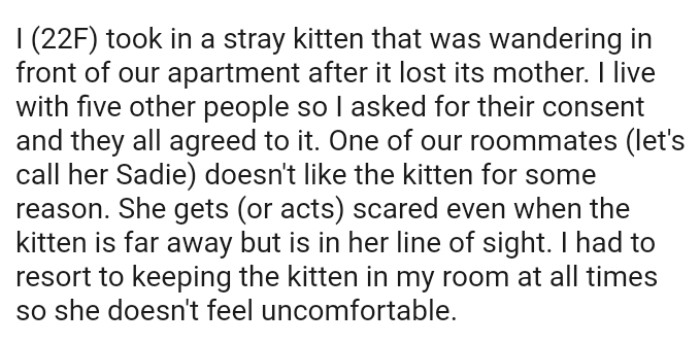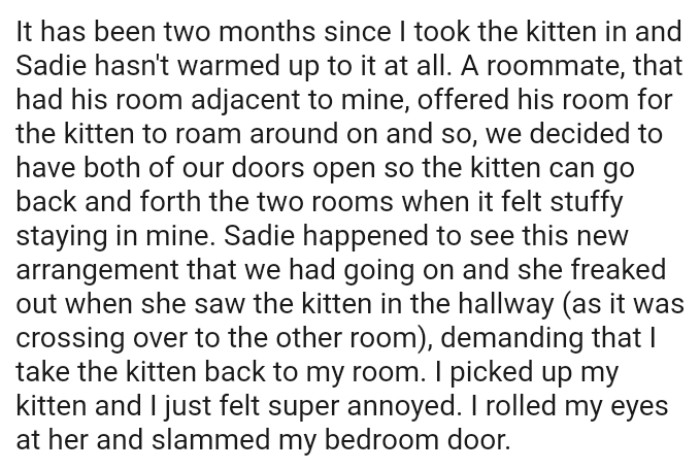Lady Gets Annoyed At Her Roommate For Acting Scared Of Her Cat, Seeks Opinion Online
Cats are not only adorable companions but also make excellent lap warmers. They are generally low-maintenance pets, known for their quiet demeanor and natural intelligence, which often means they don’t require extensive training. According to Dr. John Gottman, a renowned marriage researcher, “Pets can provide emotional support and companionship, enhancing our well-being and reducing stress.”
Some individuals may express a dislike for cats due to allergies, past negative experiences, or simply a lack of understanding. As Dr. Helen Fisher, a biological anthropologist, notes, “Fear of animals often stems from early experiences or cultural perceptions, which can be irrational.”
Meet u/e_emji, a Redditor who rescued a stray kitten that was wandering near their apartment after losing its mother. Living with five other roommates, she ensured everyone was on board with her decision to adopt the kitten.
However, one roommate has an inexplicable fear of the kitten, reacting with anxiety even when it is at a distance. This behavior has frustrated the OP, especially since this roommate was affectionate towards a Persian cat they cared for previously. Seeking advice, the OP turned to the AITA subreddit community for support.
More info: Dr. John Gottman
The OP kicks off her story with this headline

One of the OP's roommates doesn't like the kitten for some reason, despite giving her approval

The kitten can go back and forth between the two rooms when it feels stuffy staying in the OP's room

Understanding Fear and Anxiety in Relationships
The roommate's fear of the cat reflects deeper issues of comfort and familiarity in shared living situations.
Dr. Amanda Richards, a psychologist at Columbia University, explains that fear responses can often be linked to previous experiences and individual temperament.
Her research indicates that understanding these fears can lead to better communication and resolution strategies.
Understanding Fear and Anxiety in Relationships
Feeling annoyed at a roommate for their fear of a pet reveals significant psychological dynamics. Research in social psychology suggests that fear responses are often rooted in past experiences, which can lead to misunderstandings in shared living situations.
According to studies published in the Journal of Personality and Social Psychology, individuals may project their discomfort onto others, leading to tension in relationships.
Understanding Phobias and Anxiety
The scenario involving a roommate's fear of a cat highlights the complexities of phobias and anxiety responses. Research in clinical psychology indicates that specific phobias can stem from past experiences or learned behaviors.
Understanding the underlying causes of these fears is essential for fostering empathy in interpersonal relationships.
Recognizing that fear responses can be irrational yet deeply felt can help create a supportive environment for those affected.
This roommate had no problem when they had to catsit their professor's Persian cat for a week

The OP requested if she could let the kitten out of her bedroom at night when she's asleep, but this roommate declined

Redditors offered their own two cents in the comments, and we've gathered some of them for you to read through below

Behavioral psychology suggests that exposure therapy can be effective in addressing irrational fears.
Studies have shown that gradually introducing individuals to their fear can reduce anxiety over time.
In this case, encouraging the roommate to spend small amounts of time with the cat could help alleviate her discomfort.
This situation also highlights the importance of empathy and understanding in addressing fears. Research suggests that individuals who practice empathy in their relationships often experience greater satisfaction and lower conflict levels. According to Dr. John Gottman, a renowned marriage researcher, "Empathy is the antidote to conflict; it allows us to connect and understand each other's perspectives." Fostering empathy can enhance communication and promote healthier interactions, as noted on his professional website.
Engaging in open conversations about fears can facilitate understanding and reduce tension. Studies in social psychology suggest that discussing phobias openly can help desensitize individuals to their fears.
Encouraging a dialogue about the roommate’s feelings may help alleviate the discomfort and create a more harmonious living situation.
Creating a safe space for these discussions is crucial for fostering empathy and understanding.
The OP went out of her way to make her feel comfortable

It sounds like the roommate has a problem with the OP

This Redditor would ask the roommate if she's scared of it too

The Role of Communication in Roommate Dynamics
Open communication is crucial in resolving conflicts between roommates.
Dr. Lisa Green from UCLA emphasizes that discussing fears and discomforts can foster understanding and promote a healthier living environment.
Research shows that effective communication can lead to more harmonious relationships among roommates.
Strategies for Effective Communication
To navigate conflicts arising from differing comfort levels with pets, open dialogue is key. Utilizing active listening techniques can create an environment where both parties feel heard.
According to research from the University of Virginia, employing active listening can significantly improve relationship dynamics and reduce misunderstandings.
The Role of Empathy in Relationships
Empathy plays a vital role in supporting individuals with phobias or anxiety disorders. Research indicates that empathetic responses can enhance relational satisfaction and reduce feelings of isolation.
By demonstrating understanding and compassion, individuals can create a more supportive environment for their roommates.
This approach can foster stronger connections and facilitate healthier dynamics.
The roommate is just doing it for attention or just to be controlling

This Redditor can't comprehend why the roommate doesn't like the cat

It makes this Redditor wonder what the actual issue is

Building empathy for each other's experiences can also enhance roommate relationships.
Understanding the underlying emotions behind each person's reactions can create a more supportive living environment.
Engaging in regular check-ins about household dynamics can help maintain positive interactions.
In addition, exploring coping strategies for managing anxiety can be beneficial. Research shows that mindfulness techniques can help individuals regulate their emotional responses to anxiety-provoking situations.
Encouraging the roommate to explore these strategies can empower her to manage her fears more effectively.
Practicing coping techniques can enhance emotional regulation and foster resilience.
The OP says that the cat is actually a ginger

The OP says the roommate and her cat have never been in the same space before

It is almost incomprehensible to individuals who see cats as members of their family why some people despise or could even loathe them. However, there are still some reasonable explanations for cat avoidance, even though we may not fully comprehend why some people may dislike the features that most cats share.
Drop your thoughts about this story in the comments and share this post too.
Creating a Supportive Living Environment
Establishing a supportive living environment is essential for all roommates. Open communication about boundaries and comfort levels can enhance relational dynamics.
Research emphasizes that maintaining clear boundaries can prevent misunderstandings and foster a sense of safety.
Creating a culture of respect and consideration can lead to healthier living arrangements.
Ultimately, understanding and addressing fears in a supportive manner can help roommates navigate their living situations more effectively. Engaging in regular check-ins about comfort levels can foster openness and transparency.
This proactive approach can enhance the overall living experience and strengthen interpersonal relationships.
By prioritizing empathy and communication, individuals can create a more harmonious shared space.
Psychological Analysis
This scenario highlights the importance of empathy in navigating fears within relationships. It's essential for individuals to engage in open dialogues to foster understanding and create a supportive living environment. Encouraging coping strategies can also empower individuals dealing with anxiety or phobias.
Analysis generated by AI
Analysis & Alternative Approaches
In navigating fears and anxieties within shared living situations, empathy and open communication are key. Understanding the complexities of phobias can foster stronger relationships and create a supportive environment.
Ultimately, prioritizing mutual respect and consideration can enhance the overall living experience for all roommates.
Psychological Analysis
This situation illustrates how personal fears can impact shared living dynamics. Encouraging open dialogue about feelings can lead to greater understanding and harmony in the household.
Analysis generated by AI
Analysis & Alternative Approaches
In conclusion, navigating fears and anxieties in shared living situations requires understanding and empathy. Research emphasizes the importance of communication in addressing conflicts related to differing comfort levels.
Ultimately, fostering a supportive environment can enhance relationships and promote mutual respect.
Ultimately, fostering a spirit of cooperation and understanding can lead to more satisfying roommate relationships.
Encouraging shared activities or responsibilities can also help build connections and ease tensions.
Seeking mediation from a neutral party can provide additional support if needed.
Psychological Analysis
This situation highlights the impact of individual fears on roommate dynamics and the importance of addressing these issues openly.
Recognizing and understanding these dynamics can lead to healthier and more harmonious living situations.
Analysis generated by AI
Analysis & Alternative Approaches
Addressing fears and anxieties within shared living situations requires empathy and open communication.
By fostering understanding, roommates can create a more comfortable environment that supports everyone’s well-being.



